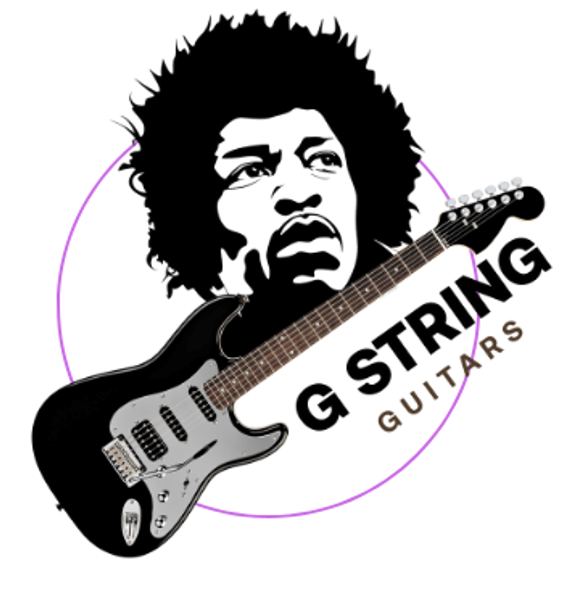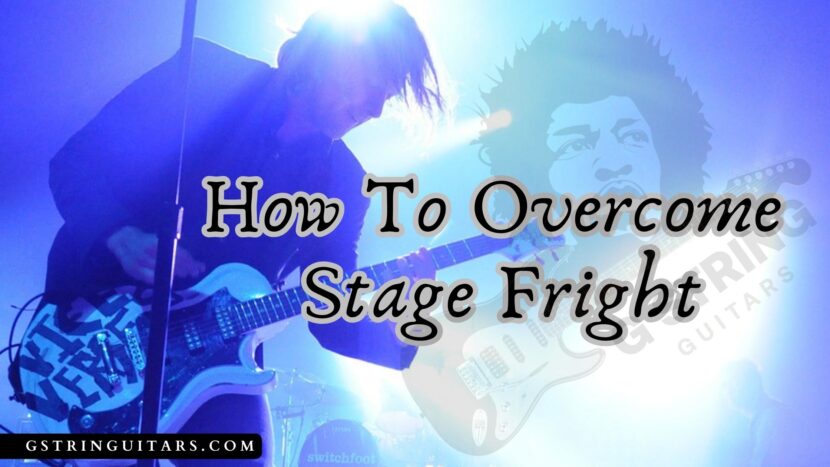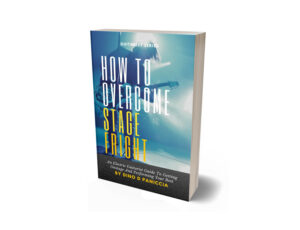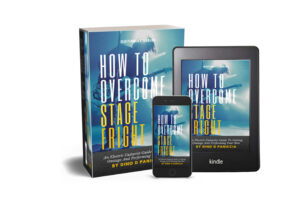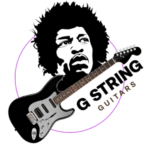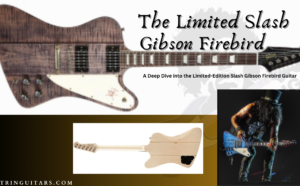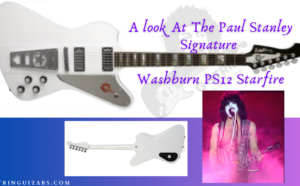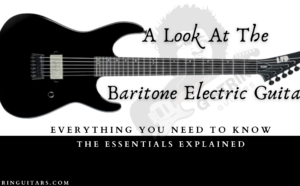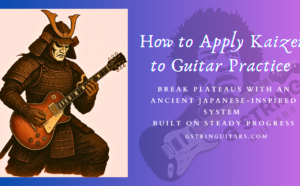Performing On Stage can be Daunting, but Overcoming Stage Fright is Possible with the Right Approach. Here are Some Quick Tips to Help You Conquer those Nerves and Shine in the Spotlight. Read on…
This Post May Contain Affiliate Links
In compliance with the FTC guidelines, please assume that some of the links on these posts and sites are affiliate links (Amazon or others) from which I may earn a small compensation/commission from sales of certain items at no extra cost to you from qualifying purchases.
Anytime you see a link that looks like “astore.com, paid link, #ad, #CommissionsEarned or Amazon/Amazon.com/ca,”… it can be assumed that it is an affiliate link.
To learn more, follow the link below.
How To Overcome Stage Fright With Ease
For many guitarists, performing in front of an audience can be both exhilarating and terrifying.
Stage fright, or performance anxiety (we will use both terms), is a common challenge that can affect even the most seasoned musicians.
This article will explore How to Overcome Stage Fright with various techniques/strategies for building confidence and conquering your fears.
Understanding Stage Fright & Anxiety

Anxiety is at the core of Stage fright and is a natural response to the pressure of performing in front of others. It can affect anyone, regardless of their experience level and does not indicate weakness or a lack of talent.
In a 2012 study, Gordon Goodman, in his book Stage Fright: Who Needs It, estimated that 77% of the population has anxiety in public speaking environments, and 80% of actors and musicians deal with anxiety when making movies and performaning live, with it affecting some veteran musicians like…
Symptoms
Anxiety is a natural response to the pressure of performing and can manifest itself as 2 different types of symptoms.
The first, psychological, arises in the mind and relates to a person’s mental or emotional state. It can include…
- Excessive worry, nervousness, doubts, fears, mood swings, negative self-talk, self-criticism, and an inability to focus.
The second, physiological, relates to a biological change that regulates the body’s normal functions and can include…
- Muscle tension, trembling, dry mouth or nausea, difficulty thinking, excessive sweating in the hands, face, and underarms.
The science behind this anxiety suggests that, like public speaking, Stage Fright can activate our fight-or-flight response.
Fight Or Flight
According to Psycologytools.com, this response is an automatic physical reaction to an event perceived as frightening or stressful. This threat or perceived threat triggers the nervous system to prepare the body for fight or flee.
While helpful in actual dangerous situations and can enhance physical capabilities, anxiety as an onstage guitar player can be overwhelming and counterproductive.
What Triggers This Anxiety?

Most performers’ stress is attributed to fear of failure, which is further extended into how the audience will perceive them and a negative evaluation of their presentation.
Guitarists generally set high standards and expectations for themselves, causing pressure to perform flawlessly. This can lead to confidence issues when their playing does not go according to how they envisioned it or is based on poor past experiences.
Not Limited To Public Performances
Even though we are talking about Stage Fright, this anxiety can occur in various performance situations that may not be as public as performing live, such as auditions, rehearsals, and recording sessions.
Can Anxiety Be Handled?
While managing and reducing this anxiety is possible, eliminating it is unlikely; stage fright is a natural part of performing.
The good news is that anxiety can benefit the player on many levels and can be both a taskmaster and a powerful ally if it is under control and handled.
Ultimately, the goal should not be to eradicate stage fright but to develop strategies to cope effectively and channel the nervous energy into a positive, controlled performance.
Realizing that it’s all just a “mind game” and essentially a battle with yourself, seeing it as a source of excitement and readiness will help prepare you to perform at your best.
The Pre And Post-Stage Strategies
Pre and Post-stage will cover everything needed to ensure confidence in your abilities. This will translate to better onstage-quality performances and help you maintain a playing standard from which to operate, with a bonus of “how to handle just before walking onstage.”
1) Pre-stage Approach
 Skill Maintenance & Development
Skill Maintenance & Development
Because the guitar is so touch-sensitive, consistent focus on daily practice helps you stay acquainted with the instrument. This allows you to express yourself freely while building muscle memory, and it should include not only the physical approach but also the music theory.
Learn and incorporate new techniques, exercises, and theory applications into your routine regularly to prevent boredom and develop continually.
In-Person Learning
Consider participating in live in-person workshops, seminars, and masterclasses to learn from experienced guitarists and leading industry professionals.
Learning from others in live, in-person environments can provide new insights and techniques that enhance your playing, help you stay relevant, and accelerate your learning and growth.
These events also provide networking opportunities with other musicians and industry professionals who can provide mentorship, valuable insights and advice.
Online Learning
Another way to stay updated on trends and innovations in the music industry is by utilizing online resources such as tutorials, online courses, forums, or social media platforms.
Engage with an online community by offering advice, sharing resources, and contributing to discussions.
Listening to various music genres and artists from online sources such as Utube will broaden your musical pallet and understanding, influencing your playing style.
Use Recording Software
Practice with backing tracks and recording software. These tools can make practice sessions more interactive and enjoyable, along with developing your ear and providing valuable insights into your playing.
Listen to the recordings to identify areas for improvement and build confidence in your abilities.
Ear Training
Ear training as a performing guitarist cannot be overstated.
Using your ear to play is crucial for your onstage career.
The ear not only makes it easier to learn songs and identify keys, intervals, chord changes and harmonies, but it also teaches you to listen to what is happening musically around you when you are playing with other players.
Practice Standing Up
Since 90% of your live gigs will require you to stand, the electric guitar is designed with this in mind.
Practice playing standing for the guitar will feel different from sitting.
Most of the time, the left-hand position changes, making standing uncomfortable. So ensure that your guitar strap is at the most comfortable height and the wrist isn’t straining.
This will help you feel much more relaxed in this position and build up the correct posture and mechanics for when you actually stand in front of an audience.
Playing With Other Musicians
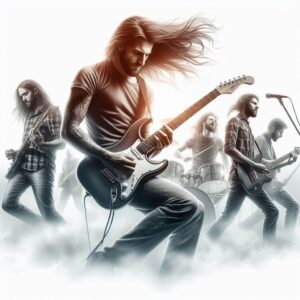
The best pre-stage preparation is playing with other musicians in a controlled, impromptu, low-key live playing environment. This helps you apply what you’ve learned in solo practice and builds future stage confidence.
The adrenaline and energy of this type of live performance can be incredibly motivating and rewarding.
Jam sessions can provide insights into your playing that you would not be exposed to in solitary studies, such as full-volume playing.
Gradually increasing performance opportunities in a supportive environment can help desensitize performers to anxiety triggers and build resilience.
Full Volume Playing
Not knowing what you sound like at total volume before delivering it for real can be a mistake. The body/mind/nervous system needs to know how this “feels,” and replicating a full-volume guitar as closely as possible to a live arena setting can be a valuable asset.
Visualization
Visualize a successful performance; imagine yourself playing confidently and the audience responding positively. The brain often responds to imagined experiences as if they were real.
Regularly visualizing successful performances can desensitize you to the anxiety associated with live gigs. The more familiar you become with the mental image of success, the less intimidating it feels.
Visualization Tip
Close your eyes and imagine yourself on stage, performing confidently and flawlessly. Visualize the audience enjoying your music and applauding. This mental rehearsal can help reduce anxiety and build self-assurance.
“When I was younger, I would picture myself, in my mind’s eye, very strongly of this guy performing effortlessly and wizard-like, with no restrictions.”
“This visualization process is so powerful.”
Pre-Stage Gear Routines
Along with creating a structured practice routine, pre-stage gear oversight will give you confidence in your playing and consistency in an uncertain environment.
Know Your Gear
Spend time regularly practicing with your primary guitar, amp, and effects pedals. Familiarity breeds confidence, and consistent use will make your setup feel like an extension of yourself.
Experiment with different settings on your amp and pedals. Understand how each knob and switch affects your sound. This knowledge allows you to dial in your tone during a performance quickly.
Preventative Maintenance
Staying on top of your gear maintenance by regularly checking for issues helps prevent unwanted anxiety. Ensure your strings are in good condition, your guitar is tuned, and your amp and pedals function correctly.
Preventive measures include always having spare strings, picks, cables, and a backup power supply.
Preparing For Technical Issues
Technical issues can arise anytime, so it’s essential to be ready.
Learn basic troubleshooting skills to identify and fix common issues, such as buzzing cables, loose connections, or malfunctioning pedals.
Practice handling these issues during rehearsals so you can stay calm and efficient if they occur during a live performance.
Tip
Understand your signal chain thoroughly. Knowing your signal’s path from the guitar to the amp helps you identify where problems may occur.
Redundancy
Have spare gear, including an extra guitar, backup amp, and cables. This ensures you can continue playing even if something fails.
Along with preventative maintenance and technical issues, redundancy means double and triple-checking your gear setup to ensure everything is functioning correctly and within easy reach in case of technical problems.
2) Post-Stage Approach
Identifying Strengths & Weaknesses
Constructive self-criticism is essential for growth without undermining your confidence.
Focus on addressing the areas that need improvement.

Reflect on the aspects of your performance that went well, such as your technical execution, stage presence, and audience interaction.
Identify areas where you felt you needed more confidence or encountered issues. This could include technical difficulties, moments of nervousness, or sections of songs that need more practice.
Be Objective
Base your self-criticism on specific, observable facts rather than subjective feelings.
- For example, note that you missed a chord change rather than thinking you were terrible.
Frame your self-criticism in a positive light, so instead of dwelling on mistakes, view them as opportunities for learning and improvement.
Balanced Perspective
While it’s important to recognize areas for improvement, remember to acknowledge your achievements. Celebrate the things you did well to maintain a balanced perspective.
Approach self-criticism with a constructive mindset. Focus on solutions and strategies for improvement rather than simply highlighting flaws.
Seeking Useful Feedback
External feedback provides valuable insights that you might overlook in self-evaluation. Here’s how to seek and utilize feedback effectively.
Choose Trusted Sources
Seek feedback from fellow musicians who understand the technical and physical aspects of playing live and ask for feedback to gain perspectives on your stage presence and overall performance.
Ask Specific Questions
Ask specific questions to get detailed feedback.
- For example, “How was my timing during the solo?” or “Did my stage presence engage the audience?”
Let your trusted sources know you value honest and constructive feedback, and reassure them that their insights are crucial for your growth.
Analyze & Prioritize
Take time to review the feedback carefully. Look for common themes or recurring points that multiple people mentioned.
Prioritize the changes that will have the most significant impact on your performance.
Focus on addressing these areas in your practice sessions.
Celebrating Overall Successes
Celebrating your overall successes is just as important as identifying areas for improvement. Recognizing progress helps build confidence and motivation.
Use your successes as a foundation to build on; each achievement reinforces your skills and boosts your confidence.
Identify your strengths from your successes and continue to develop them. Confidence in these vital areas helps leverage growth and improve overall performance.
3) Advice For “Just Before & Being On-stage”
Tips For The Moments Leading Up To The Performance
The moments leading up to your performance are crucial for setting the tone for a successful show. Here are some tips for effectively handling the initial rush of nerves during this critical time.
Good Nights Rest

Studies show that not getting enough sleep can lead to increased stress levels and may cause you to feel anxious during your performance.
The night before a show, consider getting to bed earlier, limiting caffeine intake in the evening, avoiding personal gadgets and screen time, and getting a long walk in to help your muscles relax before bed.
Arrive Early
Arrive at the venue early to get comfortable with the environment. Familiarize yourself with the stage, lighting, and sound setup. This will help reduce the feeling of unfamiliarity and allow you to make any necessary adjustments.
Find A Quiet Place To Prepare
Warm-up
Use this quiet time to warm up your hands on the instrument and get changed for the show.
Start with exercises to loosen up your fingers, hands, and wrists. This prevents injury and improves finger dexterity. Then, begin with simply playing and getting into the mindset of reacquainting yourself with your guitar.
Remain Calm
At this point, you have done everything humanly possible to prepare, so view your nerves as a sign of excitement and readiness.
Adrenaline can enhance your focus and energy if channelled correctly, but remain calm.
Following your pre-show routines will create a sense of normalcy and control. Consistency helps reduce anxiety.
Focus On The Music
Shift your focus from the audience to the music. Concentrate on your first notes and chords, allowing the music to ground you.
Keep your mind focused on the current song and avoid thinking ahead to the next one. Play each note with intention and awareness.
Choose a few focal points on the stage or in the audience to help center your attention and avoid distractions.
Dealing With Distractions
Distractions are inevitable during live performances. Here’s how to handle them:
Stay Composed
If a minor distraction occurs, ignore it and stay focused on your playing.
If a significant issue arises, such as a technical malfunction, stay calm and address it efficiently. Your composure will reassure the audience.
Use Distractions Positively
Sometimes, humorously acknowledging or incorporating a distraction into your performance can endear you to the audience and keep the energy positive.
Tips For Engaging With The Audience
Audience Perception
Guitarists often believe that their anxiety is evident to the audience.
The truth is that minor mistakes usually go unnoticed or are quickly forgotten by the audience, but this misconception can intensify anxiety.
Remember that the audience is generally more focused on the overall performance than on individual moments of nervousness.
Visual Connection
Make eye contact with different sections of the crowd. This creates a sense of connection and makes each audience member feel involved.
Use facial expressions and gestures to convey emotions, like smiling. Your expressiveness helps communicate the music’s message and draws the audience in.
Interaction
Take moments between songs to talk to the audience. Share brief stories, thank them for coming, and make them feel appreciated.
Encourage the audience to clap, sing along, or respond to prompts. This will make them feel like active participants in the performance.
Interacting with your bandmates on stage can create moments of spontaneity and fun, making the performance more enjoyable for the people watching.
Use open and welcoming body language, and avoid crossing your arms or turning away.
Feed Off The Energy
The audience’s energy can boost your performance. Engage with them, and let their reactions fuel your enthusiasm.
Adjusting To The Crowd
Listen to the audience’s reactions and adjust your performance accordingly. If they’re energetic, match their energy. If they’re more reserved, create a more intimate atmosphere.
Bonus Tip
JUST DO IT!
Nothing beats the experience of getting on stage and playing, and note that most live performances will go well, whether you feel you are in control or not!
Tip
Take advantage of every opportunity to perform, whether it’s at open mic nights, local gigs, or jam sessions. The more you perform, the more comfortable you’ll become on stage.
Guitar virtuosos like Marty Friedman believed that you could speed up your guitar abilities if you played live in front of an audience.
Video
Final Thoughts
 Not The Same For Everyone
Not The Same For Everyone
Different strategies work for different individuals; what works for one performer may not work for another and will differ from person to person when managing stage fright.
Your journey will involve personalizing your approach and finding what best suits your needs.
There is no one all-encompassing solution, but with some focused attention to this very real issue, you can raise the level of your performance game and probably have a little more fun in the process.
Rewarding Experience
Remember this: playing guitar in front of an audience can be one of the most rewarding and satisfying experiences, whether it’s for 20 or 20,000 people.
It can become addictive, and you will find that, before long, you can’t wait to get up there and perform again and again.
Remember how far you have come as a player when you walk out on the stage.
Unnecessary Pressure
Don’t put unnecessary pressure on yourself when getting ready to perform.
The time to experience pressure is while practicing at home or rehearsals with your band.
The gig is not the time to put additional stress/pressure on yourself. Yes, you need to concentrate on your actions, but have fun.
If you won’t allow yourself to have fun during a live concert, when will you ever actually enjoy the guitar and music?
Exciting News: Introducing My New First Book
Hello, fellow G String enthusiasts!
I am thrilled to share some exciting news with you today.
After months of hard work, dedication, and countless hours of research, I am proud to announce the release of my new book: “How To Overcome Stage Fright- A Guitarist Guide For Performing At Your Best.”
What’s Inside?
In this book, I delve deep into the world of playing live and dealing with performance anxiety providing invaluable insights and battle-tested strategies to help you confidently step onto the stage, banish performance anxiety, and unleash your full musical potential.
What To Expect From This Value-packed Little Book
- Master Your Mindset: Learn why stage fright occurs and gain practical techniques for managing anxiety and performing at your peak every time.
- Proven Strategies: Discover a comprehensive toolkit of tips and strategies developed by a seasoned guitarist, ensuring you’re prepared for any performance scenario.
- Build Lasting Confidence: Break free from the grips of stage fright and cultivate lasting confidence that empowers you to shine on stage and enjoy the thrill of performing.
- Elevate Your Performance: Uncover secrets to refining your stage presence, connecting with your audience, and delivering electrifying performances that leave a lasting impression.
- Transform Your Journey: Turn stage fright from a roadblock into a stepping stone, unlocking new levels of creativity, expression, and fulfillment in your musical journey.
Whether you’re a novice or a seasoned player, the insights and techniques shared in this book apply to guitarists of all levels, helping you build a solid foundation for overcoming stage fright and excelling on stage.
See you on the inside.
How To Get Your Copy
You can grab your copy of “How to Overcome Stage Fright—A Guitarist Guide For Performing At Your Best.” by tapping on the image below…
I would love to hear your thoughts on the book!
Once you’ve read it, feel free to share your reviews, comments, and questions in the comments section below or on our social media channels.
Let’s keep the conversation going and continue to celebrate our shared love for guitar music.
Thank you for being a part of the G String guitars community.
Your support means the world to me, and I can’t wait to embark on this new publishing journey with you.
Rock on!
Did You Like This Article?
Check out my post on How To Get Back On-stage After A Long Break
Also…
If you want me to review a favourite guitar or guitar topic, leave your comments in the section below.
As always, stay the course and keep playing.
Feature Image courtesy of Joanna D’Ancona from Pixabay
All Ai Generated Images done on the Microsoft Copilot platform
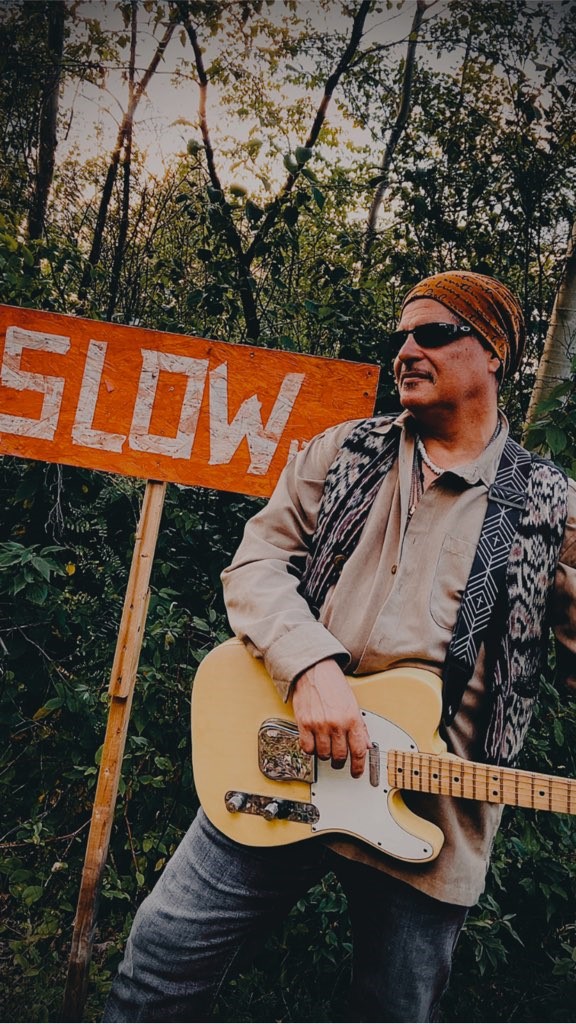
Starting A Journey At 7 Years Of Age, The Love For The Guitar Only Became Stronger Going Into My Teens. This Leading To An Exciting Time Of Teaching, Performing, And Recording. Join Me Now As We Can Bring The Love Of This Instrument To Other Musicians Globally.
